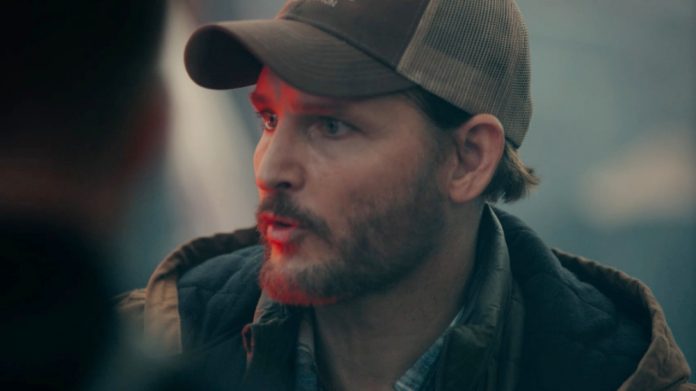Peter Facinelli is an actor who likes to mix it up — on any given project, he might also be involved as a writer (Loosies), a producer (The Unbreakable Boy), or a director (The Vanished), or some combination thereof.
Facinelli’s latest film, the indie drama On Fire, found the Nurse Jackie star and Twilight franchise alum playing hero on both sides of the camera. In addition to playing a man whose family is caught in the middle of a raging wildfire, Facinelli stepped in to direct the last leg of the film after original director Nick Lyon was sidelined by COVID-19 in the middle of the shoot.
Lyon co-wrote the script with Ron Peer and also produced the film alongside Facinelli, who is joined by Fiona Dourif (playing his pregnant wife), Asher Angel (his son), and Lance Henriksen (his father). The indie film is set for theatrical release on Friday, Sept. 29.
Above the Line recently caught up over Zoom with Peter Facinelli, who was allowed to discuss On Fire – and only On Fire – thanks to SAG-AFTRA’s interim agreement. Here’s what he had to say…
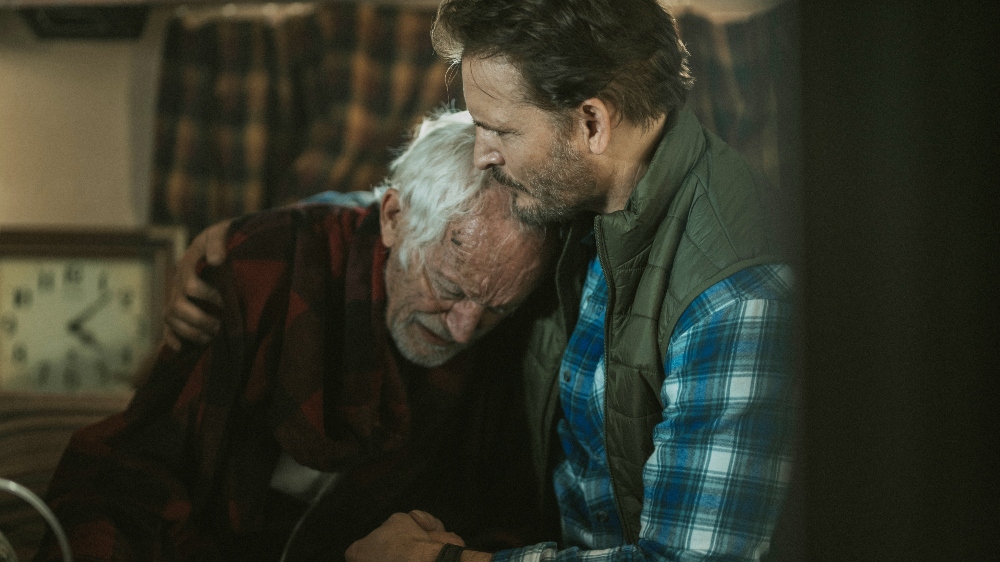
Above the Line: How strange is it to be doing interviews in the midst of the SAG-AFTRA strike, and being allowed to in this circumstance?
Peter Facinelli: It’s a mixed bag because as an actor, it breaks my heart. Other actors who are in studio films have worked so hard on them. I know how painful it is to work so hard on something and then not be able to promote it. My heart goes out to those actors because I understand. I have a studio film as well in the can, and if it came out right now, I wouldn’t be able to promote it.
On the other hand, I’m very incredibly proud of this film being independent and having a non-struck company as a distributor. Our producers signed the interim agreement. They didn’t have to. They could have put this movie out under the old agreement, and the actors would be getting nothing. They really stood by us and said, ‘You know what? We want to support you guys. We want to support the strike.’ They’re taking a risk.
Streamers aren’t picking up movies right now that have signed the interim agreement because they don’t want to give the residuals. If this film comes out and does extremely well, then they look over the fence and go, “Wow, we really want that,” [and] the back door is our agreement. They would have to give all the actors exactly what we’re asking for.
There was some confusion in the beginning. It was called a waiver. It sounded like actors were getting around something, but this is the actual agreement that we want [the] AMPTP to sign. The fact that these [indie] producers signed it is a positive thing, and we should be applauding them for doing so. I want to support them the way they supported us. In that way, it feels great to be a leader, [since] this is one of the first films going to theaters that signed under the new agreement.
ATL: How hopeful are you that this will all get settled relatively soon?
Facinelli: Every day you wake up and hope that it does. It’s putting a lot of people out of work — not just actors and writers, but directors as well who have no fight in this. They’ve signed their agreements and they didn’t strike, so now they’re out of work. This spills all the way down. Even being able to do press like this, where you’re [technically] working…
The other day, I went to a promotional event. I had a hair and makeup team that was working, and they were so thankful. The driver was so thankful. All those people that are being put back to work because the interim agreement was signed — those are vetted and approved by SAG-AFTRA — so I’m really proud to have their support in promoting this film.
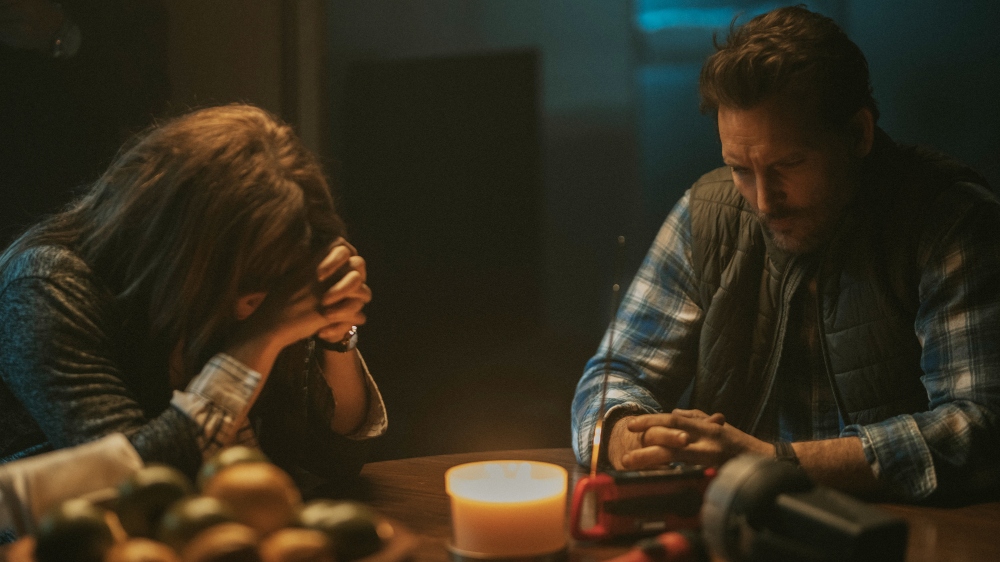
ATL: Let’s talk about On Fire. How did it come your way initially?
Facinelli: I read the script. My agent sent it to me. I read it and I thought, “This is an interesting film,” because there had been so many fires at that point in time. It felt like such a prevalent issue. I thought, “Look, this isn’t a documentary version. If anything, it’s more of a throwback to a family survival film.” It has a lot of takeaways and a lot of wonderful layers inside of that umbrella.
One of them was — for me — giving an in-depth look at what the victims of these fires go through. You see people on the news; they’re telling their story and your heart goes out to them, but then the next day, people go back to work. They get their chai lattes and nothing’s being done to fix it. At the end of the day, this movie was always meant to be an entertaining, suspenseful, survival film, but under the umbrella, I was hoping maybe it could give pause to what we can do about this issue that seems to be more prevalent and more of a problem.
[It was] also [a chance] for us to celebrate firefighters and 911 operators, [and] give them some celebration. Towards the end of the film, we do that. We [share a] message of hope and rebirth. It was important to us to have all these layers within the umbrella of this family survival drama.
ATL: That’s one of the things I liked about the film — that it touched on everything you just said. It’s part survival film, part family drama. There’s a subtle faith-based message in there. There’s the element of supporting first responders. How surprised and pleased were you with how the script threaded all of that together without being too didactic or preachy?
Facinelli: We worked hard to do that. It was definitely on my mind as we were carving and editing the film, to touch upon [certain] things. We touch upon global warming, but we don’t want to beat [anyone] over the head. We touch upon faith, but we don’t want to beat [anyone] over the head. [So], we touch upon elements, [and] everybody who watches it can have a different takeaway.
One of the themes that I enjoyed in the script and in the film was [that of] family. When you meet my character, he’s [dealing with] a mountain of issues. He’s got a new baby on the way. He’s got a new job. He’s a construction worker [and] he’s trying to get this company off the ground that he started. He’s got a son who is going to a college that he can’t afford and hopes he can get a scholarship because otherwise, he doesn’t know what to do. He’s got a sick dad who’s got bills. He’s under an immense amount of stress and pressure. Then this event happens, and he’s thrown into this harrowing experience with his family.
Through that, his perspective is, at the end of the film, “If I could get through that, I could get through anything. These bigger issues that I thought I had were anthills.” He’s so thankful that he just has his family. That’s a beautiful journey and takeaway in and of itself. Watching the family grow with each other as the film goes on, there is no one hero. Each one of them has heroic moments and they lean on each other. That’s so beautiful to watch as well.
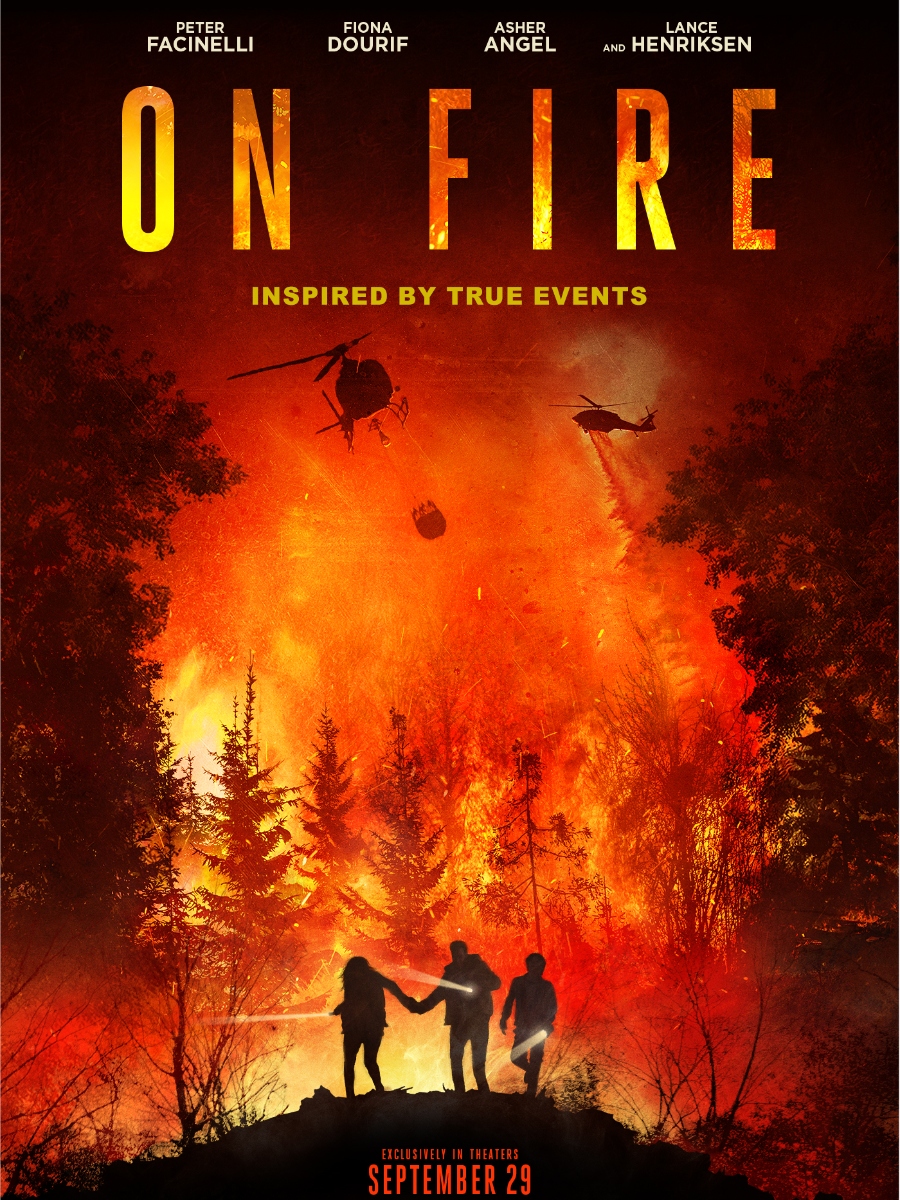
ATL: The fires look real. Take me through how much fire was practical on set and how much was done with VFX that were added later.
Facinelli: Nick Lyon, the co-director, brought a lot of his knowledge [with regard to] making bigger action films [that] have a smaller budget. He had a lot of practical lighting. He used a lot of lighting. We didn’t have any practical fire, to be honest. We weren’t allowed to; we were in the middle of a forest. We had some flame bars for foreground stuff, but all of it was lighting packages and smoke. As an actor, the challenge became that we had to react to things that weren’t there all the time. That required an immense amount of imagination and focus because you can’t ever be half-assing that.
ATL: So it was done with green screens?
Facinelli: No green screens. We were at the actual location, and they just added the fire later. You’re running from a house that’s not on fire, but as an actor, you have to imagine what it would feel like for that fire to be burning your neck as you’re running. The sweat, the smoke. You have to constantly remind yourself you’re in this fire where it’s hot and sweaty. The smoke sometimes dissipates, but you still have to play it.
There’s a lot to remember, even in the scenes where you’re working with people. That’s a challenge as an actor because you’re constantly using your imagination and reminding the other actors, “Okay, don’t forget to be coughing, because we’re running.” Then I’ll be looking up at the sky and looking at embers that aren’t there, but I have to imagine what that would be like. In post, we put all that stuff in. We had a great CGI team, and we worked hard with them to make sure that it came off looking realistic.
We had some stock footage that we put in. Threading that fire in became a balance as well; you don’t want to put too much fire, because then all of a sudden you get numb to it. It was holding it back until you needed it and showing some stock footage mixed in with CGI. The true test, for me, was when I watched the film. I couldn’t tell the difference between what was stock and what was CGI.
ATL: OK, so Nick falls ill. Take me through how you then stepped in to help bring the film to the finish line.
Facinelli: We were having a wonderful collaboration, Nick and I. We both respect each other as filmmakers and writers. We would work together to elevate scenes that kept trying to pepper in certain takeaways and themes in the film so that you feel like something is set up and [it] pays off later. We were constantly, in every scene, working together to create that stuff.
When he fell sick, it was like we were losing the captain of the ship; we were too far out at sea to go back to port. Nick trusted me enough and knew I understood what we were making enough to say, ‘Hey, here’s the baton. Keep going.’ At that point, I had been working closely with the crew and [the] other actors, so I felt confident enough to keep going and [got it] finished.
Then we took that collaboration into the editing room and carved out the movie that you saw. We’re happy with it. It was fun to work with another artist on something.
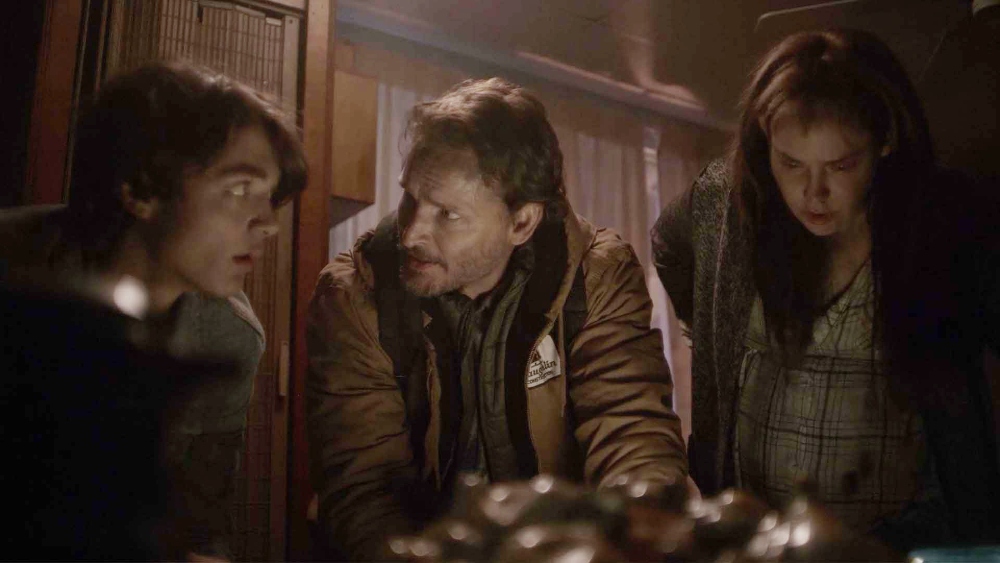
ATL: When you were talking to Nick about stepping in to direct, did you agree that you would be part of the editing process?
Facinelli: No, it was more about… because I had captured enough pieces, and I was there on set, I knew what we had on that end. Nick was also there [from] the beginning. It was his film; I was there to just aid. There were moments when he did his cut and gave notes that he invited me in and we were like, ‘Okay, why don’t we do this together?’ It became more of a collaboration.
For example, the first time we watched the movie with a temp score, the score was all action and it felt to me like we were missing out on a lot of emotional beats. It felt like we were trying to force it into something it wasn’t. We brought on the composer from my last film [Sacha Chaban], and I said to him, ‘Look, treat it like it’s an alien invasion, like this fire is coming in and invading us. It’s growing. It’s getting more and more powerful. Slow the music down.’
The music helped [guide] where you should be emotionally, and he knocked that out of the ballpark. I said, ‘Save most of the action for the last 10 minutes, because if you use it too much then we won’t know where to go.’
It’s about finding that rhythm of the movie — the emotional beats — and having the music support [it]. I’ve worked with him a couple of times, and he’s so great. I said to him, ‘It must be hard being a composer because when you do your job right, nobody hears your music.’ You never want to hear music in film, you want to feel it; if you’re hearing it, it’s taking you out of [the] film. When you’re feeling it, you don’t hear it; you’re just feeling this emotion and you don’t know why.
There’s one scene where Fiona Dourif’s character and I were in this trailer, talking about my dad, and it’s a very emotional scene. He had some score behind that and it was beautiful. I thought, “The movie needs a moment of silence.” I feel like silence in and of itself is so powerful. We took the score out, and it felt so much better. Sometimes you have to know when to use it and when not to use it. Silence is as much of a score as music is, and having that moment of silence, at that point, felt powerful. Then, all of a sudden, everything starts to get crazy again.
ATL: How important is it to you to continue writing, producing, and directing, in addition to acting? Would you be okay just being an actor or is doing this other stuff a must for you personally?
Facinelli: It’s not a must, honestly. I come in when I’m needed. I fill the position. I’m a utility man. I’ll fill the position wherever they need me to be. I’ll play second base, third base, outfield if you need me to. Otherwise, I’ll be on the bench just directing and watching. It depends on what the movie is and where I was needed. [On] this one, I was needed a little bit more as an actor than in previous movies.
There’s a movie that I have — which I won’t mention the name of because we’re on strike — but that one, I found the book and I produced it, then I ended up taking a smaller role and giving the lead to somebody else because they felt more right for the role. For me, it’s wherever I feel like I can best service the story or wherever I feel like I could best service getting the movie to the best place it can be, is where I’ll step in.
Cineverse will release On Fire exclusively in theaters on Friday, Sept. 29.


